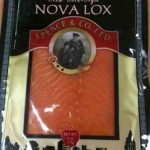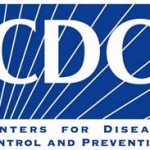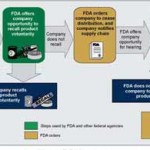The Centers for Disease Control and Prevention (CDC) is reporting that a new strain of norovirus called GII.4 Sydney has appeared in the United States. Norovirus is the leading cause of epidemic gastroenteritis in this country. Those who develop serious complications from the disease are young children, the elderly, and those with compromised immune systems. In the past ten years, new GII.4 strains have emerged every two to three years, replacing older strains. When these new strains appear there is usually increased outbreak activity. GII.4 Sydney has caused 53% of the norovirus outbreaks reported in September-December 2012 through CaliciNet, an electronic laboratory surveillance network. Scientists believe the virus originated in Australia and was first detected there in March … [Read more...]
Help with Food Product Problems
Food Poisoning Bulletin has received quite a few questions about how to handle food that has been recalled or who to contact about a potential issue. If you believe there is a problem with meat, poultry, and processed egg products, call the USDA Meat and Poultry Hotline at 1-888-674-6854. For restaurant problems, call the Health Department in your city, county, or state. The Food and Drug Administration (FDA) handles complaints about all other food products. You can reach them at 1-888-723-3366, or write to them. Preserving the food, if it is something you purchased from a grocery store, farmer's market, or street vendor, is critical to the investigation. Keep the original container, any foreign object that you found in the food, and uneaten portions. Refrigerate or freeze the food if … [Read more...]
Linked To Outbreaks, Dumped By Retailers, Sprout Growers Form Safety Group
Last month, Kroger, one of the nation's largest grocery store chains announced it would no longer carry sprouts because they pose too large a food safety risk. One week later, a handful of sprout growers announced the formation of a new group: Sprout Safety Alliance. “I am very happy to see this new organization taking a leadership role in addressing sprout safety. Sprouts are a challenging product and it is time for members of the industry to get ahead of the safety issues related to sprouts,” former FDA Commissioner Dr. Les Crawford, said in a statement. Whether it’s time or about time growers got ahead of food safety issues is for consumers to decide. Sprouts have so long and consistently been linked to foodborne illnesses outbreaks, they have their own moniker: sproutbreaks. … [Read more...]
Kroger Stops Selling Sprouts
In the past 10 months, there have been many recalls of raw sprouts for bacterial contamination and one large outbreak linked to sprouts in Jimmy John's sandwiches. The CDC advises many consumers to avoid raw sprouts altogether or to cook them thoroughly before consuming. Now a national grocery chain, Kroger, has decided to stop selling sprouts. Payton Pruett, Kroger's vice president of food safety, said in a statement, "after a thorough, science-based review, we have decided to voluntarily discontinue selling fresh sprouts. Testing and sanitizing by the growers and safe food handling by the consumer are the critical steps to protect against foodborne illness. Sprouts represent a unique challenge because pathogens may reside inside of seeds where they cannot be reached by the currently … [Read more...]
Study Finds Third Party Food Safety Auditors Follow Orders From Food Industry, Not FDA
A study conducted by Bloomberg Markets has found that third party auditors hired by the food industry are not required by follow any federal standards and have no government supervision. Drew Kerr of Bloomberg Markets Magazine sent us the story and a statement about the study. He said, "it turns out some of the biggest food poisonings of the last few years were given sterling marks from the industry-paid auditors." The study, published in the November issue, details the illness of Nellie Napier, an 80-year-old grandmother of 13 who died in the 2009 King Nut Peanut Corporation Salmonella outbreak whose family is a client of Pritzker Olsen. She is one of nine people killed by the bacteria that also sickened 714 people in 46 states. AIB, the third party auditor that checked on Peanut … [Read more...]
Food Workers to Blame for Most Norovirus Outbreaks, Study Shows
A study conducted by the Centers for Disease Control and Prevention and published in Emerging Infectious Diseases has found that most norovirus outbreaks are caused by food workers handling food. Norovirus is the leading cause of foodborne illness outbreaks in the United States, responsible for 58% of all outbreaks from known agents. The virus is spread through several methods: person-to-person transmission, ingestion of aerosolized vomitus, and indirect transmission through contaminated surfaces, food, or water. The virus can stay alive on surfaces for two weeks and in water for more than two months. It is also quite resistant to many disinfectants. The most frequent pathways to contamination are through infected food workers or exposure to water contaminated with fecal … [Read more...]
CDC Releases Cryptosporidiosis Surveillance Report
The Centers for Disease Control and Prevention (CDC) has released its 2009 - 2010 surveillance summary for Cryptosporidium in the United States. The Cryptosporidium protozoa causes the gastrointestinal illness cryptosporidiosis. During the reporting period, fifty state and two metropolitan public health agencies (District of Columbia and New York City) reported cases of the disease through the CDC's National Notifiable Diseases Surveillance System. In 2009, 7,656 confirmed and probable cases were reported. That increased to 8,951 confirmed and probable cases in 2010. The cases were most frequently reported in children aged 1 to 9 years, followed by adults aged 25 to 29 years. The cryptosporidiosis rate in the Midwest was 1.3 to 2.9 times greater than other regions in 2009 and 1.8 to 4.6 … [Read more...]
Spokane Produce Recalls Pineapple Mango Pico De Gallo
Spokane Produce, Inc., is voluntarily recalling Pineapple/Mango Pico de Gallo for potential contamination with Salmonella Braenderup. The product was made with Daniella mangoes from Mexico which have been associated with a Salmonella outbreak that has sickened 103 people in 16 states. The recalled product was sold refrigerated under the brand labels Garden Patch or Yoke's. It was distributed to supermarkets in Washington, Idaho and Montana 16 oz. plastic containers with the UPC code "8869483987." Salmonella can cause serious, sometimes fatal infections in young children, frail or elderly people, and others with weakened immune systems.Symptoms of a Salmonella include fever, diarrhea (which may be bloody), nausea, vomiting and abdominal pain. Infections that escape GI tract and enter … [Read more...]
FDA Needs Better Way To Tell Consumers About Food Recalls, Says GAO
When a food safety issue requires a recall, delivering fast, accurate information to consumers can limit the spread of illness and in some cases, save lives. But quickly disseminating recall information to consumers is not a strong suit of the U.S. Food and Drug Administration (FDA), one of the federal agencies charged with protecting our nation's food supply, according to Government Accountability Office (GAO). "FDA faces a number of communication challenges when advising the public about food recalls or outbreaks of foodborne illness, ranging from balancing technical accuracy with timeliness of communications to coordinating messages with other agencies to meeting the needs of diverse public audiences. The agency has taken steps to begin meeting these challenges but has yet to fully … [Read more...]














